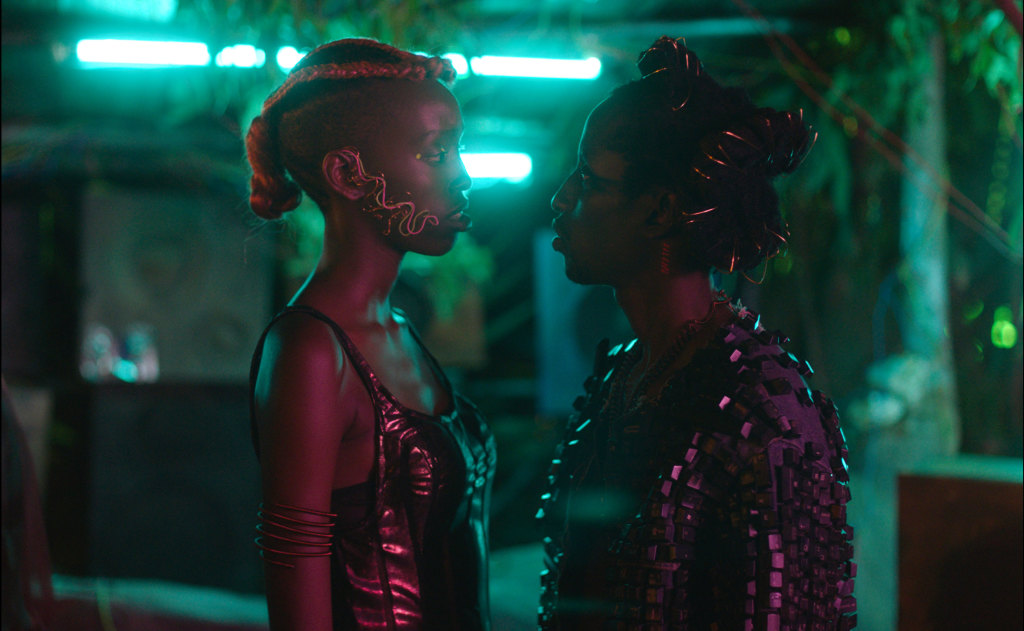I find myself at a loss for how to review the film Neptune Frost in a coherent way. How can I reduce the experience of this anti-colonial, anti-capitalist fever dream – with a to-die for aesthetic and some absolute bangers that won’t leave your headspace for a good while – to a few paragraphs?
On IMDB, the story of Neptune Frost is summarised like so: ‘An intersex African hacker, a coltan miner, and the virtual marvel born as a result of their union.’ Such a brief description doesn’t really do the film justice. It doesn’t mention vital details like the story being delivered in musical format, or the fact that the writer and director is Saul Williams, a well-known African American rapper and slam poet.

Opening on a coltan mine in post-apocalyptic Rwanda, our protagonist (Bertrand Ninteretse) Matalusa (a reference to both Williams’ album MartyrLoserKing and activist Martin Luther King) witnesses the untimely death of his friend Techno, and is radicalised into finding the hidden hacker’s paradise Digitaria. There he will cross paths with the titular Neptune (played by both Elvis Ngabo and Cheryl Isheja), an otherworldly being that lives as both man and woman.
Importantly, this narrative is not told in a traditional, linear way, and key bits of exposition are left to the latter half of the film, which makes the viewing experience quite disorienting. But Saul Williams’ (and co-director Anisia Uzeyman) rejection of form shouldn’t put you off – rather it should make you question what a film can be when it’s approached as a truly malleable artform.
If Black Panther‘s afro-futurism being presented under the traditional, capitalist grip of Marvel made you cringe, then Neptune Frost is the movie for you.
MartyrLoserKing
Sitting between the genres of rap, punk, and drum & bass, the tracks from Saul Williams’ MartyLoserKing are a fine display of poetic prowess, and the film’s narrative glue.
One of the film’s most stunning moments occurs early on, when Matalusa dreams of revolutionary man with spinning bicycle wheels on his head (‘revolutionary’, get it?). The man sings him a call to action – a treatise of rejecting binaries and making ‘fire in the skies’. The ultraviolet lighting and neon-soaked costumes here make for some addictive visuals, and you can’t help but feel the pull of their digital fantasy land.
The camera work is equally dreamy and dazzling, with some standout shots of riding on a pigeon’s wing, and being spun around in ecstasy as Neptune undergoes a magical male-to-female transition. And it would be remiss of me to not mention the sound work, which is used ingeniously to make up for a lack of VFX budget (which I guarantee you won’t miss at all).
Digital style
It’s the costume and set design that must surely be the major draw card for Neptune Frost – how many of us will see the image of a man wearing wired jewellery, sitting in a den composed of old computers and neon lights and immediately add it to our watchlist? (Many!)
Cedric Mizero is the man responsible for these outlandishly vibrant clothes and decor. Using parts of old phones, computer monitors, wires and keyboards, he’s constructed a unique look that warrants much praise and discussion. Why choose to have old technology represent what is supposed to be the distant future? The answer is in the film’s obsession with the in-between.
The choice to have minimal spoken dialogue and little grounding for each track makes the film reminiscent of modern visual albums like Beyonce’s Lemonade and Janelle Monae’s Dirty Computer. Like both of those master works, Neptune Frost has a clear stance on gender, futurism, and Black oppression.
But unlike those works, Frost makes a point of stationing its characters in a linear space – not just literally, as they transcend invisible walls to find the enshrouded Digitaria, but also bodily and mentally. The people are between classes, between states, and between fantasy and reality. And the character Neptune, who I assumed to be a transwoman, is actually described as intersex – so, between sexes.

Although the hacker collective that live in Digitaria are shown as working class heroes, who fight the powers that be, they are not without their faults. It seems that in trying to detach themselves from the world of modern slavery, they have lost touch with reality a bit and struggle to do meaningful activism. This is where the film’s bold ambitions are laid bare: in trying to be a musical, a low budget sci-fi spectacular, and a political statement all in one, its final act tends toward being messy and almost unintelligible.
Still, the entire thing is a compelling, unforgettable experience, and definitely one worth catching – if you can – before it leaves MIFF and the online platform MIFF Play this month.
Other reviews and articles in our MIFF 2022 series:
The Exam serves a ‘politically backward’ view of Kurdistan, by Leila Lois
Of An Age film is a tender and romantic Melburnian treat, by Silvi Vann-Wall
Three Thousand Years of Longing: George Miller’s wish upon two stars, by Izzie Austin
‘Under Cover’ and ‘Because We Have Each Other’: director interviews, by Stephen Russell
Neptune Frost will have two more screenings at MIFF, on the 14 and 19 of August. It is also available to stream on MIFF Play from 12-28 August.
Actors:
Director:
Format: Movie
Country:
Release:





